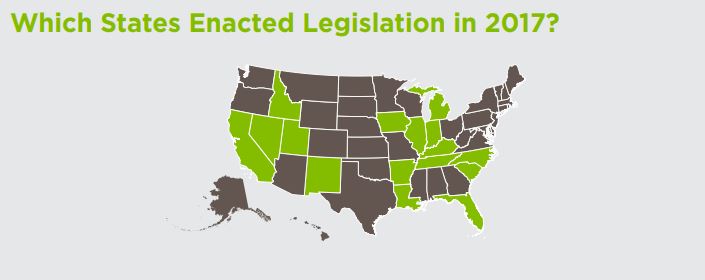March 30, 2018
Will States Keep Student Growth in Teacher Evaluation Systems After ESSA?
By Bellwether

Share this article
Shortly after the Every Student Succeeds Act (ESSA) passed in December 2015, I predicted that the lack of federal requirements on teacher quality issues in the law would cause states to make changes to their teacher evaluation systems and laws. I was particularly concerned states would roll back the use of student growth measures — gains in student learning as shown through progress on assessments and/or student learning objectives over time, which are then used as one measure of teacher effectiveness. I argued that student achievement is a more robust and predictive measure of teacher quality than other measures such as classroom observations.
A little over two years later, a new policy snapshot from the Education Commission of the States (ECS) shows my prediction was partially right: In the 2017 legislative session, at least 20 bills/resolutions were enacted or adopted in 16 states addressing the purpose, design, authority, and progress of teacher evaluation systems. And while student growth measures are being reconsidered, they are largely not being abandoned.
Some of these newly introduced bills do not hamper the progress of teacher evaluation systems. For example, in Idaho, House Bill 300 provides funds to help districts comply with the state’s teacher evaluation requirements. But Arkansas, Kentucky, Michigan, and Utah completely removed student growth from teachers’ evaluations. While those are extreme cases, even Florida — a pioneer in the teacher evaluation space — made changes to its student growth component. Florida House Bill 7069 maintains the requirement that at least one-third of teachers’ evaluation be based on data and indicators of student performance, but removes the requirement that student growth be derived from the state’s value-added model — leaving the measure to district discretion.
Shortly after the passage of ESSA, my colleague Sara Mead and I wrote a report offering advice to local policymakers and advocates about teacher evaluation in a post-ESSA era. In it, we urged local actors not to rush to action on teacher evaluation even though they might be tempted to with the long-awaited passage of the federal law. We also recommended that states preserve the role for student achievement and growth in teacher evaluation systems if for no other reason than it sends a clear signal that quality teaching is defined in part by impact on student learning.
State policy changes in teacher evaluation systems post-ESSA highlighted by ECS do not necessarily mean that states did not follow our advice. Yes, as I predicted, many states are taking a critical look at student growth in their teacher evaluation systems, but the vast majority haven’t completely abandoned the idea. After all, in 2015, 43 states required teacher evaluations to include some measure of student growth, and by the end of 2017, the number only dropped to 39. It is natural, and in many cases a good sign, that states continue to fine-tune their teacher evaluation requirements. But it remains to be seen if wholesale backpedaling on student growth components will become the larger trend in upcoming legislative sessions.
